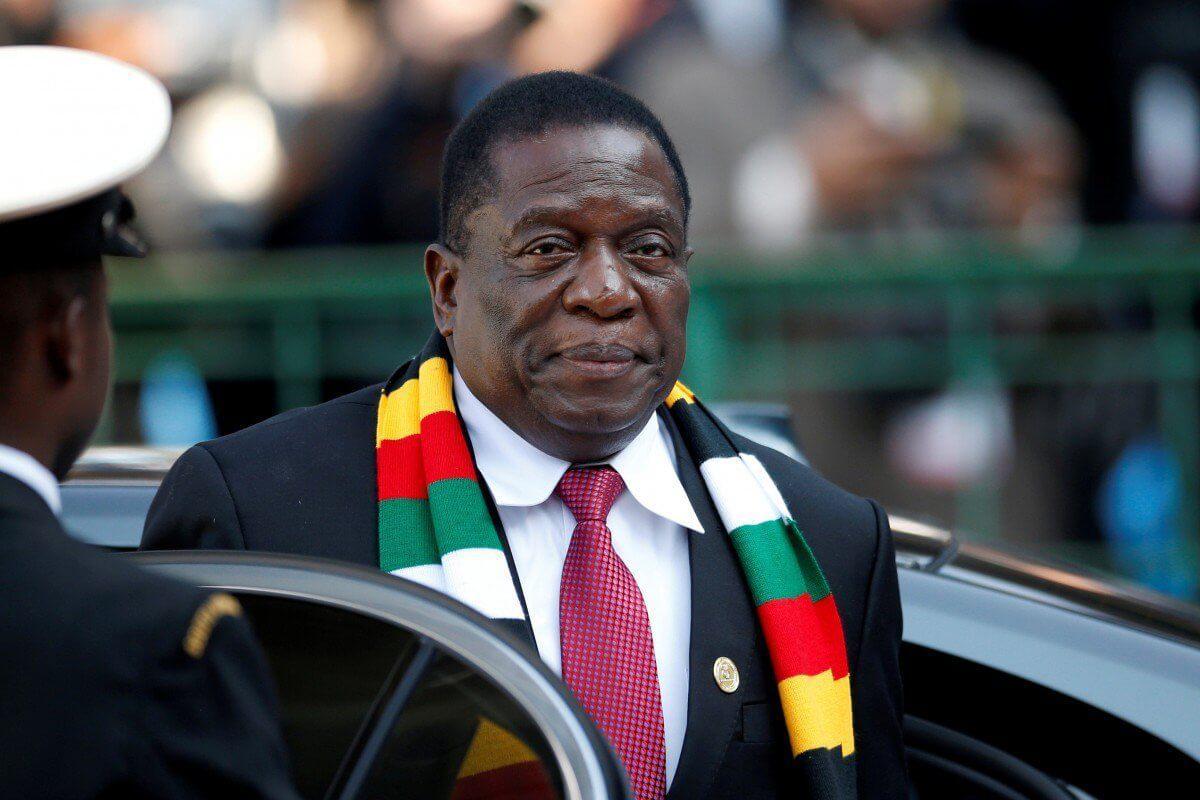By the standard
Africa-Press – Zimbabwe. Manoeuvres by President Emmerson Mnangagwa’s government to amend the constitution have raised concern that the 82-year-old ruler wants to reverse progressive electoral reforms and return the country to the dark days of the Robert Mugabe era.
The government recently signalled that it will propose constitutional amendments that will significantly alter Zimbabwe’s electoral processes.
One of the proposed major changes would be to transfer key responsibilities such as voter registration from the Zimbabwe Electoral Commission (Zec) to the Registrar-General’s office.
The changes will also remove the responsibility for the delimitation of electoral boundaries from Zec and reintroduce a delimitation commission.
Observers such as the Zimbabwe Election Suppport Network (Zesn) say “removing such integral processes from Zec isboth retrogressive and a reversal of past progressive electoral reforms”.
“This further compromises the independence of Zec by allowing separate government bodies to perform roles directly linked to the commission’s duties,” Zesn said.
“This jeopardises the commission’s stewardship of elections, and ultimately erodes citizens’ confidence and trust in electoral processes.”
Political analysts and election watchdogs said it was concerning that the government has chosen to ignore August 2023 recommendations by election observer missions to reforming Zec to enhance transparency and independence in its handling of electoral processes.
Multiple election observer missions expressed deep concern and stated that the country’s electoral processes did not meet regional and international standards for credibility.
The Southern African Development Community (Sadc) and other international electoral observation missions cited problems with Zec on matters to do with transparency, independence, fairness, and credibility at all stages of the electoral process.
Some of the drawbacks cited by observer missions include lack of transparency in running and unveiling the voters’ roll to all stakeholders, skewed electoral boundary numbers and well as the mishandling of ballot papers in Bulawayo and Harare.
Voting was extended in the August 2023 elections after Zec failed to print and deliver ballot papers in time in what the opposition said was systematic rigging to deny its urban voters a chance to cast their votes.
The United States noted systemic bias against political opposition during the pre-election period amid reports from civil society groups that Zec officials pressured election observers to sign altered polling station result forms.
On August 23, police arrested staff from respected civil society organisations engaged in lawful election observation.
Observers said the arrests frustrated efforts to independently verify Zec’s official results, a fundamental component of democratic processes in the region and around the world.
Observer missions said the Zec should follow strict provisions of the constitution on transparency, access to information and unveil the voters register as prescribed in the Electoral Act in order to improve perceptions among the public, political parties and candidates.
Zanu-PF immediately objected to concerns raised by observer missions before singling out the Sadc preliminary report and its chairperson Nevers Mumba of Zambia, noting that no nation should meddle in another country’s political affairs.
Former Citizens Coalition for Change (CCC) leader, Nelson Chamisa, has refused to accept election results announced by Zec after accusing the electoral body of rigging.
Returning to the pre-2009 electoral framework that was presided over by the Registrar General’s office will further erode trust in Zimbabwean elections, Zesn says.
Former registrar general Tobaiwa Mudede was often accused of rigging polls in favour of Zanu-PF through massive voter registration fraud.
According to documentary evidence presented by the then MDC opposition led by the late Morgan Tsvangirai urban constituency voters’ rolls were being stuffed with mysterious names and ghost voters.
Mudede was accused of compiling two separate voters’ rolls in an attempt to disenfranchise suspected Zanu-PF rivals in both urban and rural areas.
In some cases, steep rises were recorded in certain constituencies, raising suspicion that the rolls were being tampered with.
Before presidential elections in 2002, Mudede told a meeting at the International School in Harare that, “he could imagine no circumstances in which he would declare anyone other than Mugabe the winner.”
In 2002, a report by the South African Institute for Race Relations revealed there were 42 000 people over the age of 100 on the voters’ roll and that this was an “impossible” number.
Some of the people on the voters’ roll appeared to be 120 years old.
Political analyst Rejoice Ngwenya said the proposed changes must be out rightly rejected as they take Zimbabwe back to the dark days under Mudede.
“Basically the constitution got it right that Zec must manage the entire electoral value chain and taking us back to the Tobaiwa Mudede era is not only a travesty of electoral justice,” Ngwenya said.
“It is also an act fraught with criminal intention, plagued with conflict of interest.
“The central registry manages birth, death and ID information. If any institution can pervert the voters’ roll, it’s them.”
Ngwenya added: “All progressive political parties and enlightened civic groups must fight this diabolic move to the death.”
Election Resource Centre legal and advocacy officer, Takunda Tsunga, said the proposed amendments ignore challenges that have dogged the country’s elections.
“Voter registration is not the issue; it’s the symptom of a greater problem being the credibility of elections,” Tsunga said.
“Voter registration rates are low because centres are not accessible and people do not see elections as a credible platform to exercise their democratic rights.
“The issues. which the government seeks to address, namely, voter registration, can be addressed by administrative changes and not constitutional changes by simply coordinating efforts between the departments and not taking away the function from Zec.”
Tsunga said voter registration being conducted by Zec was best practice.
“The proposed amendments also ignore numerous recommendations made by observer missions such as Sadc and the European Union following the 2023 harmonised elections, which include strengthening the independence of Zec.
“The proposed amendments do the opposite of that.” Political analysts also expressed fears over the potential impact on transparency and independence of Zec in handling electoral processes.
Another political analyst Vivid Gwede said the alterations could significantly undermine transparency in the voter registration process and the handling of the voters’ roll.
“The proposed change will undercut transparency in the voter registration process and handling of the voters’ roll,” Gwede said.
“It is taking away the process from an independent commission to appointees of the incumbent government in the civil service.
“For instance, the appointment process of Zec is specifically meant to be open and transparent. The changes will reverse progress in electoral management.”
Romeo Chasara, a political analyst said the proposed changes could erode public trust in electoral processes. “The proposed changes risk politicising the appointment process of electoral institutions, which could also undermine their independence and impartiality,” Chasara said.
“Any measures that compromise transparency and fairness in the electoral process could have far-reaching consequences for the credibility of future elections and the overall democratic stability of the country.”
Efforts to get a comment from Information ministry permanent secretary Nick Mangwana were fruitless as his number went unanswered.
Zanu-PF director of information Farai Marapira refused to comment on the matter and referred The Standard to Mangwana.
Some critics have said that the proposed changes are part of a wider plot by Mnangagwa to extend his rule if he manages to railroad changes to the constitution on presidential term limits.
Under the country’s laws, Mnangagwa is serving his second and last term.
However, indications are that Mnangagwa has started pushing for a third term through his loyalists.
Zanu-PF enjoys a two third majority to make legislation, but any idea of a third term needs a national referendum.
With Mnangagwa facing charges of running down the economy and driving millions into poverty, sources say the president feared he may not get support through a referendum.
Sources there are attempts to by-pass the referendum through some changes to the law that do not need a national plebiscite.
In 2021, Zanu-PF used its parliamentary majority to approve legislation removing a clause in the constitution on electing vice presidents, a move which critics said was intended by Mnangagwa to concentrate power in the presidency.
Parliament also extended the tenure of senior judges, who are appointed by the president in consultation with the judicial service commission, instead of being subjected to public interviews as was the case.
In 2013, Zimbabweans voted for a new constitution including a clause stipulating that the vice-president should be elected together with the president.
The clause was, however, suspended for 10 years in a compromise between the ruling party and the opposition.
“The constitution has already been amended twice, in the short span of ten years, with Amendment No. 2 alone introducing 23 changes,” Zesn said.
“Zesn believes there should be restraint in continually or heavily altering the constitution, stability and continuity of Zec in executing the 2013 roles is of great necessity.”
the standard
For More News And Analysis About Zimbabwe Follow Africa-Press






